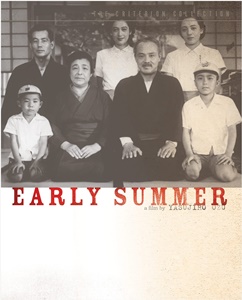One of Ozu’s more complex treatments on the institution of marriage, with a standout performance by the legendary Setsuko Hara.
Dir. Yasujiro Ozu
1951 | Japan | Drama | 125 mins | 1.33:1 | Japanese
PG (passed clean)
Cast: Setsuko Hara, Chishû Ryû, Chikage Awashima
Plot: A family chooses a match for their daughter Noriko, but she, surprisingly, has her own plans.
Awards: –
Source: Shochiku
Accessibility Index
Subject Matter: Moderate/Life-Affirming
Narrative Style: Straightforward
Pace: Slightly Slow
Audience Type: Slightly Arthouse

(Reviewed at Japanese Film Festival 2019)
Spoilers: No
Shot in between Late Spring (1949) and Tokyo Story (1953), two of Yasujiro Ozu’s greatest accomplishments, Early Summer is also sometimes known as the middle installment of the ‘Noriko’ trilogy, starring the legendary Setsuko Hara.
Hara plays Noriko, the family’s unwed daughter who is at an age where she should be thinking about settling down. She lives together with her aged parents, married older brother and sister-in-law and their two mischievous kids.
Always showing a generous heart and a ready smile for others, despite being ‘trapped’ by family conversations about potential suitors, Noriko is an exemplar of a woman who is sensitive and mature at the same time.
Out of the three ‘Norikos’, Early Summer’s has the most individual agency in what could arguably be Ozu’s strongest portrayal of any female character, one who makes life decisions for herself whilst taking things in her stride.
I have written about Ozu’s trademark style in my other reviews of his works, so I won’t repeat myself here, but Early Summer, in its little moments, does pre-empt the uncharacteristic use of a moving camera in his next film, The Flavour of Green Tea Over Rice (1952).
The scene in which Noriko walks with her sister-in-law to the beach allegedly contains the only crane shot in all surviving films of Ozu.
Certainly one of Ozu’s more complex works, particularly in its treatment on the institution of marriage, Early Summer chronicles not just one big family growing up together, but of relatives, friends and colleagues.
Some of the film’s most comical scenes involve an old uncle visiting who can’t hear well, and as such, is discreetly made fun of by the household’s two naughty kids. Although Noriko’s situation is at the center of much of the plotting, Ozu’s grasp of the peripheral characters adds extensive depth to emotional dynamics and relationships.
My favourite scene could be that of the grandfather taking a stroll out in the countryside. As he is about to cross a railway crossing, the barrier comes down. He can’t really do anything but sit and wait patiently as the train passes by. Ozu chooses a long shot in this instance, where we see him through the undercarriage of the passing train.
It is difficult not to detect the symbolism here: despite being the head of the family for decades, he (and his son) will come to realise that decision-making about family matters cannot be fiercely patriarchal anymore. Come to think of it, Early Summer is that rare quasi-feminist work by Ozu.
Grade: A-
Trailer:












[…] in between Early Summer (1951) and his crowning achievement, Tokyo Story (1953), the fascinatingly-titled The Flavour of […]
LikeLike